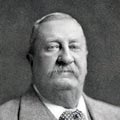Gold, Silver, Emeralds, and Pearls, Part 4
Near the Pass of Aricoma several sources of the mighty Amazon rise. The mountains here run up to close on 25,000 ft. Tirapata is the rail-head of the line. The manager of the Inca Gold Mining Company resides in the hacienda below.
About three days distant by mule is the small town of Assilo, whose chief attraction is a wonderful old church built by Padre Valverde, first Bishop of Peru. It was this gentleman who christened Atahualpa. The Inca Chief, so the tale runs, was led out of his prison at Caxamarca on August 29 1533, chained hand and foot, and attended by Valverde. The latter persuaded him to adopt the religion of his conquerors and so escape the burning at the stake, for which the more merciful method of the garotte would be substituted. Atahualpa was baptized Juan de Atahualpa, Juan being in honour of John the Baptist, on whose day the ceremony took place.
It is said Pizarro was greatly affected, and tried to have the venue of the trial altered to Spain. The most important charges levied against Atahualpa were, that he had murdered his brother Huascar, and had incited the Indians to resist the Spaniards. Pizarro and D’Almagro, who sat in judgment on him, sentenced him to death. Valverde, amongst others, signed the death warrant, and declared Atahualpa deserved his fate.
Taking into consideration the upbringing of Atahualpa’s judges, and the enormous ransom imposed, one is at liberty to doubt whether Pizarro’s emotion was feigned or not. The sentence was duly executed and announced by trumpeters in the grand square. Atahualpa’s remains were interred in the cemetery of San Francisco, but after the Spanish yoke was thrown off they were removed to Quito, in accordance with his last wishes. I visited the jail chapel at Caxamarca, and was shown the altar, which now occupies the site of the stone upon which the unfortunate Inca was strangled.
It is generally believed that the reason why the Spaniards broke faith with Atahualpa was, they felt sure they would never conquer the country while he lived. The news of his foul murder was conveyed throughout the length and breadth’ of the land, by means of whistles and other Indian methods of signalling. When it reached the ears of the natives, who were on the way to fulfil their obligations, they hid much of the treasure which they had collected, and the remainder they threw into one or other of the sacred lakes—Titicaca, Orces near Cuzco, or the little one near the top of Sorata.
Lake Aricoma occurs between two ranges of the Andes, and is remarkable as being one of the highest lakes in the world. The sight of this vast body of water at so tremendous an altitude fills one with awe.
The terrible atrocities perpetrated at Putumayo have not yet died out of people’s memories. I have never regretted participating in bringing them to the notice of the world at large. I had first-hand information from Daniel Wheeler, who was employed by Barber and Co. of Cochabamba. He threw up a £60 a month job and returned to Cochabamba, because he couldn’t stand the devilish, cruel methods of the overseers. I had opened out to Barber, when I was dining with him, and had told him the money he was making was all blood money. He wouldn’t believe what I told him, but said, if it proved to be correct, he would chuck the business altogether. He had, some time previously, announced his intention of retiring directly rubber fell to 5s. per lb.
During the period covered by these outrages, viz., from 1905 to 1907, a man named O’Donnell killed an Indian, so that he might abduct his wife. The woman would, however, have nothing to do with him. On the contrary, she reported the murderer to the Peruvian Government. O’Donnell took fright, and ran away to Barbados. The Peruvian Government asked for his extradition after the woman had been sent out to identify him. This the British Government granted, and O’Donnell was tried for his life. He escaped the consequences of his dastardly deed, however, through the wiles of his advocate, a man named Reece. This worthy contended that the documents were not in order, and therefore the Chief Justice had no jurisdiction, pointing out that no signature was attached to them, but only a rubric. His Honour asked the meaning of the term, but no one seemed able to tell him; so O’Donnell was set at liberty. The same day he took steamer to Brazil leaving his wife, who was the daughter of a prominent official, behind him. O’Donnell, I may say, owned the Hotel Amazon. Next day Dr. Messiah, a retired Government medico, asked me if I knew what a rubric was. I explained that although it was quite true no document in Peru and Bolivia is valid unless it is signed by a court official, yet, in the case of a high official, all that was required was his initials round the coat of arms, accompanied by a certain flourish. Now the O’Donnell particulars were thus inscribed, and were, therefore, perfectly in order. Some weeks after, an escort of Peruvian soldiers arrived to take O’Donnell back to Lima. Through the silly misunderstanding over the rubric, they had their journey for nothing. When the full facts came to the knowledge of the authorities, an order was issued for O’Donnell’s arrest in any part of the world where a British Consul held office. Upon this O’Donnell cleared out of Brazil, and fled to Venezuela.
During his detention at Barbados, at least three other prominent overseers sought sanctuary elsewhere, expecting, doubtless, that their turn would come next. This matter of the Putumayo atrocities was very thoroughly taken up by the British and Peruvian Governments. Ultimately the company went into liquidation and was broken up.
